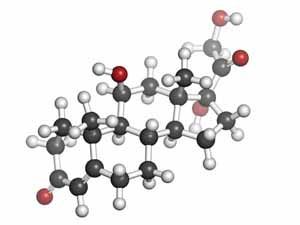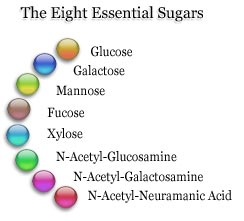What are they?
When the editors of Amazon.com reviewed the book Sugars That Heal, by Emil Mondoa, MD., they said, “Even tiny amounts of these sugars — or lack thereof — have profound effects. In test after test conducted at leading institutes around the world, these saccharides have been shown to lower cholesterol, increase lean muscle mass, decrease body fat, accelerate wound healing, ease allergy symptoms, and allay autoimmune diseases such as arthritis, psoriasis, and diabetes. Bacterial infections, including the recurrent ear infections that plague toddlers, often respond remarkably to saccharides, as do many viruses — from the common cold to the flu, from herpes to HIV. The debilitating symptoms of chronic fatigue syndrome, fibromylagia, and Gulf War syndrome frequently abate after adding saccharides. And, for cancer patients, saccharides mitigate the toxic effects of radiation and chemotherapy — augmenting their cancer-killing effects, resulting in prolonged survival and improved quality of life.”
Wow. That makes one want to learn more, doesn’t it? Can something so simple actually exist? Aside from the saccharides research listed in the bibliography, the word glyconutrient appears to be made up. That company claims that there are certain carbohydrates or sugars that are essential for good health and the only true way to get them in our diet is to purchase their product. I know for a fact that our diets no longer give us what we need on a daily basis. In fact, as a bariatric patient I, myself, lack the ability to properly absorb all the nutrients I need on a daily basis. So I am intrigued by a product that could possibly help, but still would like more evidence. The evidence table I posted below isn’t very positive, but I will keep looking.
Basically, there are sugars we need and sugars we don’t need. The 8 that are said to be essential are called glyconutrients. They are listed below.
Dietary saccharide, fucose, galactose, glucose, glycobiology, glycoconjugates, glycoform, glyconutritional, glycoprotein, mannose, N-acetylgalactosamine, N-acetylglucosamine, N-acetylneuraminic acid, saccharide, sialic acid, sugars, xylose.
glyconutrients are dietary supplements that supply sugars such as glucose, galactose, mannose, fucose, xylose, N-acetylglucosamine, N-acetylgalactosamine, and N-acetylneuraminic acid. These sugars are thought to be necessary for cells to communicate with each other in the body.
Glyconutrient research (glycobiology) has increased in the last few years. A leading manufacturer of glyconutrient supplements, however, was prosecuted by the Texas attorney general in 2009 for exaggerating the benefits of its product and was required to pay four million dollars in restitution to customers.
Studies have investigated the EFfect of glyconutrients on attention-deficit hyperactivity disorder (ADHD), cognition, immune function, failure to thrive, and myasthenia gravis (a neuromuscular disorder), and well-being. However, the scientific evidence is unclear. More research is needed before firm conclusions can be made.
[table id=1 /]
According to the resources attributed below, because glyconutrients are considered herbs or a dietary supplement, there are also certain interactions to be considered:
- Glyconutrients may alter the risk of bleeding when taken with herbs and supplements that are believed to increase the risk of bleeding. Commercial glyconutrient products may contain vitamin K or ubidecarenone, which can counter the EFfects of anticoagulants (blood thinners).
- Glyconutrients may affect blood sugar levels. Caution is advised when using medications that may also affect blood sugar. People taking agents for diabetes by mouth, or insulin should be monitored closely by a qualified healthcare professional, including a pharmacist. Medication adjustments may be necessary.
- Glyconutrients may also interact with agents that affect cholesterol levels, antioxidants, copper, copper-containing foods, fiber, fiber-containing foods, folic acid, folic acid-containing foods, immunosuppressants, iron, iron-containing foods, memory agents, phytoestrogens, probiotics, vitamin B12 and vitamin B12-containing foods.
For more information on the glyconutrient controversy, check out this site, Per that site, Update: A search on Medline in Septmeber 2017 revealed no new studies published since 2009 when using the search word “glyconutrients”.
Resources:
- Alavi, A., Fraser, O., Tarelli, E., Bland, M., and Axford, J. An open-label dosing study to evaluate the safety and EFfects of a dietary plant-derived polysaccharide supplement on the N-glycosylation status of serum glycoproteins in healthy subjects. Eur J Clin Nutr 2011;65(5):648-656.
- Axford JS, Mackenzie L, Lydyard PM, et al. Reduced B-cell galactosyltransferase activity in rheumatoid arthritis. Lancet 1987;2(8574):1486-1488.
- Bloomer RJ, Canale RE, Blankenship MM, et al. EFfect of Ambrotose AO® on resting and exercise-induced antioxidant capacity and oxidative stress in healthy adults. Nutr J 2010;9:49.
- Cook GC. Rates and mechanisms of glucose, galactose, and xylose absorption in man . Scand J Gastroenterol 1977;12(6):733-737.
- Dawson DJ, Burrows PC, Lobley RW, et al. The kinetics of monosaccharide absorption by human jejunal biopsies: evidence for active and passive processes. Digestion 1987;38(2):124-132.
- Dykman KD, Dykman RA. EFfect of Nutritional supplements on attentional-deficit hyperactivity disorder. Integr Physiol Behav Sci 1998;33(1):49-60.
- Flogel M, Lauc G, Gornik I, et al. Fucosylation and galactosylation of IgG heavy chains differ between acute and remission phases of juvenile chronic arthritis. Clin Chem Lab Med 1998;36(2):99-102.
- Freeze HH. Disorders in protein glycosylation and potential Therapy: tip of an iceberg? J Pediatr 1998;133(5):593-600.
- Kriat M, Vion-Dury J, Fayre R, et al. Variations of plasma sialic acid and N-acetylglucosamine levels in cancer, inflammatory diseases and bone marrow transplantation: a proton NMR spectroscopy study. Biochimie 1991;73(1):99-104.
- Levin RJ. Digestion and absorption of carbohydrates–from molecules and membranes to humans. Am J Clin Nutr 1994;59(3 Suppl):690S-698S.
- Malmi R, Kallajoki M, Suominen J. Distribution of glycoconjugates in human testis. A histochemical study using fluorescein- and rhodamine-conjugated lectins. Andrologia 1987;19(3):322-332.
- Panneerselvam K, Etchison JR, Skovby F, et al. Abnormal metabolism of mannose in families with carbohydrate-deficient glycoprotein syndrome type 1. Biochem Mol Med 1997;61(2):161-167.
- Routier FH, Hounsell EF, Rudd PM, et al. Quantitation of the oligosaccharides of human serum IgG from patients with rheumatoid arthritis: a critical evaluation of different methods. J Immunol Methods 1998;213(2):113-130.
- Talent JM, Gracy RW. Pilot study of oral polymeric N-acetyl-D-glucosamine as a potential treatment for patients with osteoarthritis. Clin Ther 1996;18(6):1184-1190.
- Wang C, Szabo JS, Dykman RA. EFfects of a carbohydrate supplement upon resting brain activity. Integr Physiol Behav Sci 2004;39(2):126-138.
- Scientific American, the July 2002 cover story titled “Sweet Medicine” stated, “Sugars modify many proteins and fats on cell surfaces and participate in such biological processes as immunity and cell-to-cell communication.”
- The Physicians’ Desk Reference (PDR) is consulted by 99% of all doctors and healthcare professionals before recommending solutions to their patients. glyconutrients are listed in the PDR for compromised immune systems.
- Harper’s Biochemistry, a medical textbook used to educate healthcare professionals since 1996 about glyconutrients and their role in health and healing.
- Science magazine, the premier journal for researchers and scientists, recently dedicated an issue to educating the science and medical community about glyconutrients, glycobiology and glycoscience.
- The National Institutes of Health awarded the Scripps Research Institute in San Diego, CA, a $34 million grant to understand how cells and the immune system use these sugars.


